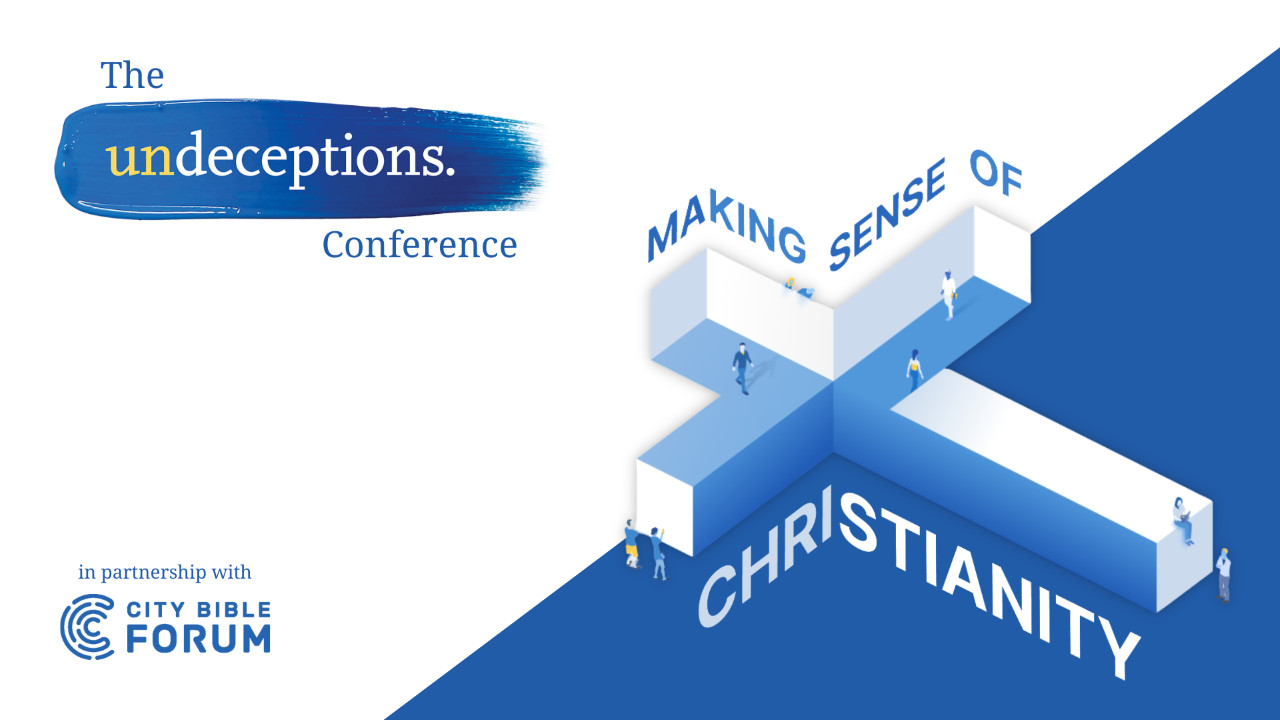Undeceptions the podcast has given birth to Undeceptions the conference in Sydney this weekend and next week in Melbourne. the sign at the conference defined “Undeceive” – “to free from deception, illusion or error.” To which might be added “and misinformation.”
“Despite all we have heard, Christianity can still make counter-intuitive sense of itself in the world,” is how John Dickson, author, academic and the host of the podcast, signalled the aim of the conference:
Here are some undeceptive nuggets that struck this observer:
• 40 years ago, sociologists were predicting the decline of religion, with the rest of the world following the West. But, as conference speaker author Rebecca McLaughlin, a leading public advocate for Christianity, pointed out, they are now expecting a growth in religion in the next 40 years. (The next few undeceptions are hers.)
• “A big shock, the proportion of atheists, agnostics and other ‘nones'”‘ is expected to decline from 16 per cent to 13 per cent.”
• Universities will need to re-engage with Christianity – with a paradigm shift expected as the failure of the secularist agenda hits home – “there is no secular worldview that does all that Christianity does but without its ideas”.
• The flaw in morality: “what sense does it make to believe that all humans are equal if you stop believing in a God who created us.”
• In researching Dominion, his history of Western thought, historian Tom Holland discovered that many of his cherished beliefs turned out to be specifically Christian ideas.
• Harvard Medical School research shows evidence for people living a religious life regularly being part of a religious community in “paper after paper,” said speaker Rachel Gilson, author of “Born Again This Way”
• Examining truth claims, City Bible Forum’s Sam Chan said that the Bible’s truth claim is that god loves you – not simply that he exists which acts as a given in the text. That truth claim is historical truth claim (the evidence is documented accounts), a legal truth claim (requiring proof), a claim of know how (experience) and a relational truth claim. Chan advanced the idea that we needed to access this an the basis of “what best fits” our data.
• The With All Due Respect podcast team discussed the term “Woke.” Megan Powell du Toit pointed out that a yougov UK poll found that it is now most often used as a pjorative term. having traced the timeline form early twentiesth century usage among US African Americans including in a Leadbelly song advising people to be woke concerning racist prejudice, it became a negative term after 2012, when a tweet about Pussy Riot went viral about the same time as Black Lives Matter emerged. Michael Jensen noted that there was a perception that being progressive was seen as an alternative to Christianity. Powell du Toit responded that 24 per cent of Christians (churchgoers) voted left of centre, in the NCLS 2016 data. (Clarification by Powell du Toit, 24 per ecnt for Labor, 2 per cent Green) Michael Jensen said. “When I am accused of being ‘woke.’ I am accused of kowtowing to moral fashion. If being ‘woke’ is is to be against racial prejudice then Christians should want to be woke.”
• Rebecca McLaughlin undeceived us about Christianity being bad for us. “A common narrative in our culture is that what springs naturally from our heart must be good. Jesus actually said the Opposite.”‘ “
• Referring to the Harvard Medical research that participating in religious community is good for you, Mclaughlin cited this USA Today article co-authored by Harvard’s Tyler J. VanderWeele. She also cited stats that women who go to church are 5 times less likely to kill themselves. That paper also by VanderWeele is here.
• Deaths of despair (alcoholism, suicide, drug overdoses) are experienced by churchgoing women at a rate 68% less, and church going men 33 per cent less according to a large study, also from Harvard Medical School, cited by McLaughlin.
• People going to church live 7 years longer McLauhlin claimed. The Other Cheek did not find that study, but the same general result comes from a large-scale Vanderbilt study.
• John Dickson announced “The First Hymn project” to bring back into use the earliest known Christian Hymn from a pyparus “P. Oxy. XV 1786” in the Sackler Library in Oxford. It gives musical notation and also honours the Trinity, Father, Son and Holy Spirit.
• In a breakout section Rebecca Mclaughlan went through the claims of a common poster in the US that says “In This House, Black Lives Matter, Love is love,” with other stances. Describing how a Christian might accept some and not others she said, “The mistake 60’s segregationaist Christians were making was that they were conforming to ther culture. Today, in a culture affirming of same sex relationships , it would also be a mistake to confirm to the culture.”
• Author Rachel Gilson described her journey as a same-sex attracted woman, now married to a man, (a similar situation to McLaughlin,) exploring why God says “no” to same-sex attraction while intuitively feels arbitrary and cruel. She explains 4 part view of marriage as mirroring God’s faithfulness, being a place to build a household of fruitfulness, and a place of joy and intimacy. She concedes that a same-sex couple could experience those three but added a fourth, love across differences, with men and women relating to the Christ and Church relationship. (Readers who wish to critique this should react to her book rather than this summary.)
• Incorporating singleness in her schema Gilson said, “In the resurrection we are all single, and all married [to Christ].


Thanks for your great summary John.